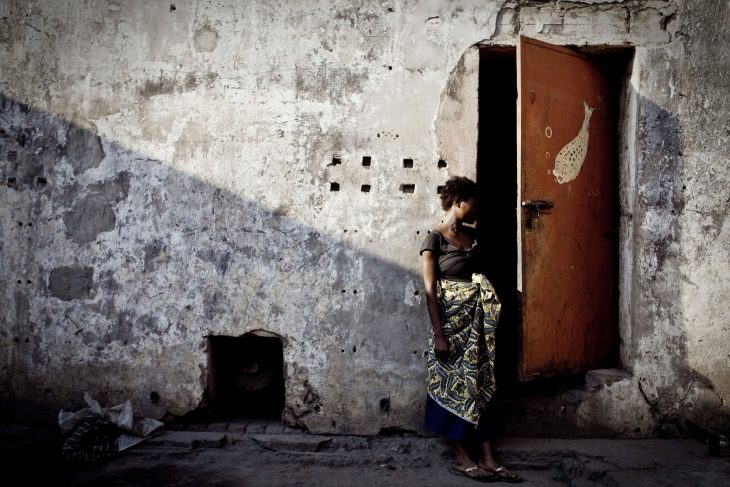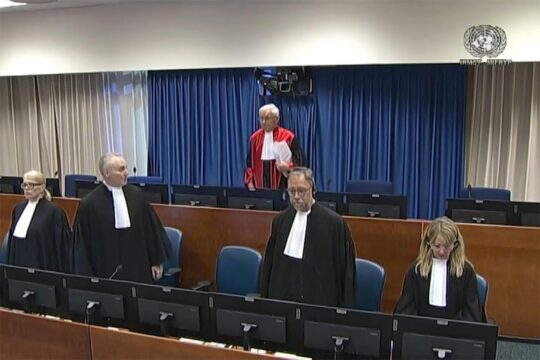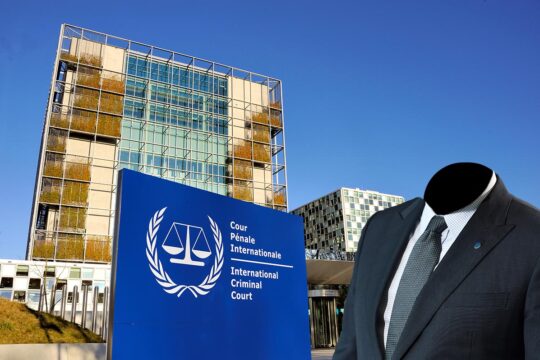“It’s truly alarming that in conflicts today there is such huge incidence of sexual violence against women, and that in fact they are targeted for rape, sexual violence, destruction of the other group,” says Navanethem Pillay, former UN High Commissioner for Human Rights and former judge at both the International Criminal Tribunal for Rwanda and International Criminal Court. “It seems to be escalating in current conflicts. As we look at ISIS now in Iraq, there’s a huge incidence of women and girls being targeted for sexual violence, sexual slavery, forced marriages.”
She says it is because the situation has become so alarming that the UN Security Council in 2009 created a post of Special Representative to the Secretary General on Sexual Violence in Conflict. The Security Council has also passed a number of resolutions on the problem, including Resolution 1325 of October 2000, which calls for participation of women in peace and reconciliation processes, and on all parties to conflict to take “special measures” to protect women and girls from gender-based violence, particularly rape and other forms of sexual abuse, in armed conflict.
So has UN action made any difference for victims?
“No, it has not made much difference for victims in terms of preventing sexual violence, in terms of protecting the women, in terms of reparations for them,” Pillay told JusticeInfo in an exclusive interview. “So all this has not been addressed. The benefit of the Security Council attention to the issue is that the Special Representative of the Secretary General now goes and sees governments and urges them, because it’s governments who have the responsibility and the power within their countries to control their militaries, for instance, to control their law enforcement officers, to pass good laws. So this kind of international attention has some benefits.”
Zainab Bangura of Sierra Leone is the current UN Special Representative on Sexual Violence in Conflict. She told us in a 2014 interview that the failure to deal with sexual violence during Sierra Leone’s conflict creates not only impunity for past crimes, but also perpetuates the problem. “Sexual violence was used as an instrument of war,” she says. “And because it wasn’t part of the peace process and the ceasefire agreement, definitely it wasn’t dealt with at the initial stage. And so as a result, as in most countries like Liberia, Bosnia, Colombia, Cambodia, a lot of the countries I work in, there’s always an increase in sexual violence after conflict.”
Bangura sees a direct link between the high rates of domestic violence, rape and other forms of sexual violence from which Sierra Leonean women still suffer and the conflict of the past. “About 65,000 women were sexually abused during the conflict in Sierra Leone,” she says. “And those are just the figures we have in terms of the people who were able to come out and agree that they were sexually abused. Sexual violence was a feature of the conflict, it was used as a means of intimidating, humiliating and degrading women, and people who committed those crimes have not been punished. In the transitional justice system that took place in Sierra Leone, it was only the people who bear the greatest responsibility who were held to account. And therefore we have hundreds of people who were part and parcel of the various armed groups that committed crimes that have not been held accountable.”
International Jurisprudence
Victims of rape and sexual violence rarely get justice. Often they are too stigmatized, poor or frightened to even seek it. Yet, even if victims on the ground see little immediate benefit, some progress has been made on the judicial front. Perpetrators of war crimes brought before international criminal courts are increasingly being convicted for sexual crimes in war.
In Rwanda, for example, Tutsi women were raped on a massive scale during the 1994 genocide. In 1998, a court of the UN’s International Criminal Tribunal for Rwanda (ICTR), with Pillay as presiding judge, found that rape could be a constitutive element of genocide.
This landmark judgment in the case of former Rwandan mayor Jean-Paul Akayesu set an important precedent for other courts. In recent years the UN’s ad hoc tribunals for Rwanda (ICTR) and the former Yugoslavia (ICTY), and the Special Court for Sierra Leone (SCSL) have included rape and sexual violence charges against many of the defendants there, and convictions have been handed down.

“Numerous judgments of completed cases at all three courts contain findings in relation to sexual violence committed against civilians and in relevant armed conflicts,” says a report of the UN’s Rule of Law department. “Sexual violence form part of convictions of genocide, crimes against humanity and war crimes. Sexual violence against civilians also takes various forms and constitutes or is part of crimes at the three courts. For example rape and other forms of sexual violence constitute or form part of the crimes of torture, enslavement, sexual slavery and persecution as crimes against humanity; of torture and outrages on personal dignity as war crimes; and of serious bodily or mental harm as genocide.”
Pillay believes this has had a deterrent effect. “Oh, it certainly has,” she told JusticeInfo. “The significance of the ICTR and ICTY rape decisions is that it had never happened before. The mentality in wars was really that women were trophies, part of the reward: you fight really hard, kill as many people as you can and then you can have the women. Except for some charges in the Japanese prosecution following Nuremberg (…), that prevailed for almost a century and almost 60 years after the UN was established. Women were viewed as trophies, as I say, as collateral damage.
“So what the decisions have done is clearly said these are war crimes, crimes against humanity. And in the Rwanda case of Akayesu, on which I shared the panel of trial judges, we found that because Tutsi women were being targeted for rape, it was with intention of destruction of the Tutsi group and therefore amounted to genocide. So these are historical developments. It’s true they were only a few cases. On the other hand, they were people in leadership positions who were charged. So that’s a huge milestone that has been reached. There’s never, ever going to be a going back on that, so that’s a gain. We can only move forward.”
DRC and Transitional Justice
“Obviously, people would say look at the huge incidence of sexual violence and rape of women but also of men in the DRC, so is it a deterrent?” says Pillay. “Now that’s where transitional mechanisms come in. We have to work on building strong institutions to counter these.”
The Democratic Republic of Congo (DRC), especially the east of the country, has been described in current times as the "rape capital of the world". Research from the American Journal of Public Health says that in the DRC, 1,152 women are raped every day, or 48 women every hour. Despite the DRC's conflict officially ending in 2003, fighting has never stopped, claiming more than five million lives since the war started nearly two decades ago. Sexual violence has continued throughout, and 12% of the female population are reported to have been raped at least once. The majority of perpetrators have not been punished.
UK newspaper The Independent, revealed in a June 2014 article some shocking testimony from perpetrators. "You see her, you catch her, you take her away and you have your way with her," it quoted a soldier as saying. "Sometimes you kill her. When you finish raping, then you kill her child. When we rape, we feel free."
Some efforts have been made at national level, including some rape charges before military courts. Also, mobile courts set up in the DRC in 2009 put a primary focus on sexual crimes. “I know that many organizations helped to have mobile courts and have some of these perpetrators prosecuted,” says Pillay, “but unfortunately in subsequent violence where M23 (rebel group) was active, they then freed all these perpetrators who had been convicted and sentenced, which is frustrating, but the message is that these crimes are ongoing, we cannot stop addressing them and looking for the evidence and involving women in that.”
Reparations
A number of post-conflict countries have had Truth and Reconciliation Commissions, including Pillay’s native South Africa, Sierra Leone and Liberia. In Sierra Leone and Liberia, the TRCs produced extensive reports with recommendations including reparations for women and children victims of sexual violence in conflict. Yet successive governments have been slow to follow up.
“I would also make that criticism,” says Pillay. “Good recommendations made by TRC Commissions, made by commissions of inquiry (…), all of them make good recommendations, all urging reparation. And why are they urging reparation for the victims? Because that is the only way you rebuild, reconstruct your society. So it’s not just for the women victims alone, it’s for the greater benefit of society as a whole. (…) So I would criticize, constantly urge that governments should prioritize the prevention of violence against women, and once it occurs to protect women and to provide reparation.”
As UN High Commissioner for Human Rights, Pillay set up a panel that managed to reach remote areas of the DRC where high incidence of rape was occurring, and talk to victims. “They very much said to our team please don’t give us any money because the perpetrators will come to know and rob us and injure us again,” she says. “So we asked them what would they like. Some of them did support monuments to mark the events, schools for their children, but one group of women asked for a boat so that they could take their vegetable produce from the villages where they grew them to the market. You see, that’s why I say, we have to consult the women.”







